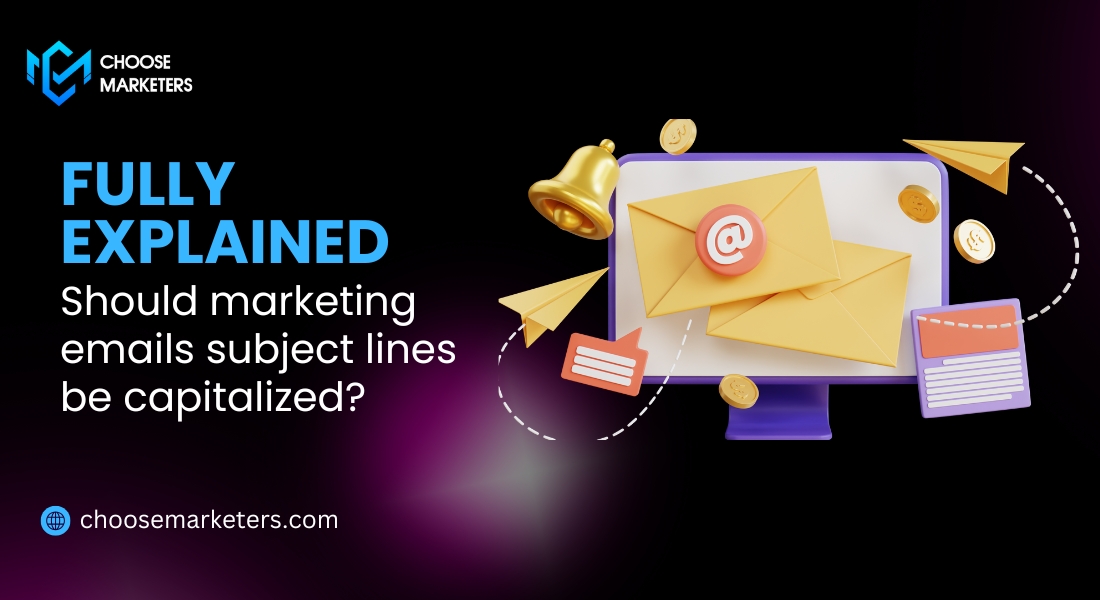

Should marketing emails subject lines be capitalized? Fully Explained
Should marketing emails subject lines be capitalized? can be a tricky question. In the competitive world of email marketing, the capitalization in your subject lines can significantly affect your campaign’s performance. The right use of capitalization can enhance open rates, influence readability, and set the tone for your message. In this blog, we’ll explore the various aspects of capitalization in email subject lines, from why it matters to how you can use it effectively to boost your marketing results.
Just like with social media content, the capitalization of your email subject lines can play a crucial role in capturing attention and driving engagement
Why Subject Line Capitalization Matters
Influence on Open Rates, Readability, and First Impressions
Capitalization plays a crucial role in how people perceive your subject line. Studies have shown that subject lines with proper capitalization can lead to higher open rates by making the email appear more professional and appealing. On the other hand, improper use of capitalization can hinder readability and create a negative first impression, potentially impacting your email’s effectiveness.
Pros of Capitalizing Marketing Email Subject Lines
Enhances Professionalism and Formality
Capitalizing key words in your subject lines can enhance the professionalism and formality of your email. This is especially useful for business communications where a polished and respectful tone is essential.
Increases Attention and Urgency
Proper capitalization can draw attention to important elements of your subject line, creating a sense of urgency. For example, using title case can make your message stand out in a crowded inbox and prompt recipients to open it sooner.
Aligns with Brand Identity and Recognition
Consistent use of capitalization in your subject lines helps in reinforcing your brand identity. It ensures that your emails align with your overall brand voice and recognition, making your messages instantly recognizable to your audience.
Cons of Capitalizing Marketing Email Subject Lines
Can Appear Overly Formal
While capitalization can enhance professionalism, it may also make your emails seem overly formal. This could be a disadvantage in contexts where a more casual or friendly tone is preferred.
Lower Readability
Overuse of capitalization can negatively impact readability. Subject lines that are too rigid or formal may be harder to read quickly, which can decrease the likelihood of your email being opened.
Potential to be Seen as Spam or Aggressive
Excessive capitalization can sometimes be perceived as aggressive or spammy. This is particularly true if your subject lines use all caps or include multiple exclamation marks, which can trigger spam filters and reduce deliverability.
Types of Capitalization in Email Subject Lines
Sentence Case
Sentence case capitalizes only the first letter of the first word and proper nouns, making the subject line appear more natural and conversational. It’s ideal for casual communications and newsletters.
Title Case
Title case capitalizes the first letter of each major word, giving the subject line a more formal and structured appearance. This style is often used for important announcements, events, and formal business communications.
All Lowercase
Using all lowercase letters creates a relaxed and informal tone. This style is becoming popular among younger audiences and can convey a conversational approach. Brands that use this style effectively create a sense of ease and modernity.
The Impact of Capitalization on Open Rates
Analysis of Studies on Open Rates
Research indicates that capitalization can impact open rates, with some studies showing higher engagement for properly capitalized subject lines. However, results can vary based on industry and audience preferences.
A/B Testing Results and Audience Preferences
A/B testing different capitalization styles can provide valuable insights into what works best for your audience. Tracking open rates and engagement metrics will help you determine the most effective style for your specific needs.
When to Use Title Case
Formal Business Communications
Title case is best suited for formal business communications where a professional tone is required. It helps convey the seriousness and importance of the content.
Important Announcements
For significant announcements, such as product launches or major updates, title case can add emphasis and importance to your subject lines.
Events and Webinars
When promoting events and webinars, title case can highlight key details and make your subject lines stand out.
When to Use Sentence Case
Casual, Personalized Communications
Sentence case is ideal for casual, personalized emails where a friendly tone is preferred. It makes your subject lines feel more approachable and engaging.
Newsletters
For newsletters, sentence case provides a balanced and easy-to-read format that suits the informal nature of the content.
Promotions and Offers
Use sentence case for promotional emails to maintain a conversational tone while still highlighting the key offer or deal.
The Rise of All Lowercase Subject Lines
Trend Among Younger Audiences
All lowercase subject lines are becoming popular with younger audiences who appreciate a more casual and authentic tone. This trend reflects a shift towards more informal and conversational communication.
Informality and Conversational Tone
Lowercase letters can create a relaxed and friendly atmosphere, making your emails feel more personal and less corporate.
Examples of Brands Using Lowercase Effectively
Brands like Glossier and Everlane have successfully used all lowercase subject lines to create a distinctive and approachable brand voice.
A/B Testing Capitalization Styles in Email Marketing
How to Conduct A/B Tests on Subject Lines
Conducting A/B tests involves creating multiple versions of your subject lines with different capitalization styles and measuring their performance. This allows you to see which style resonates best with your audience.
Sample Test Scenarios
Test scenarios might include comparing title case vs. sentence case for newsletters or all lowercase vs. title case for promotional offers.
Key Metrics to Track for Optimization
Monitor open rates, click-through rates, and conversion rates to gauge the effectiveness of each capitalization style and optimize your email campaigns accordingly.
Common Mistakes to Avoid

Overuse of Capitalization
Avoid overusing capitalization, as it can make your subject lines appear aggressive and reduce readability.
Mixing Capitalization Styles
Inconsistency in capitalization can confuse recipients and detract from your brand’s professionalism. Stick to one style per campaign to maintain clarity.
Using All Caps and Exclamation Marks
Excessive use of all caps and exclamation marks can trigger spam filters and be perceived as overly promotional. Use these elements sparingly.
Spam Filters and Capitalization
How Capitalization Impacts Deliverability
Capitalization can affect how your emails are filtered by spam detection systems. Avoid excessive capitalization to reduce the risk of your emails being marked as spam.
Spam Trigger Words and Best Practices
Be mindful of spam trigger words and follow best practices for email deliverability to ensure your messages reach your audience.
Brand Consistency and Capitalization
Importance of Consistent Capitalization Across All Emails
Maintaining consistent capitalization across all your emails reinforces your brand’s voice and identity, helping to build recognition and trust.
Aligning with Brand Voice and Audience Expectations
Ensure that your capitalization style aligns with your brand voice and meets the expectations of your target audience.
Adapting to Audience Preferences
Demographic Considerations
Consider the demographics of your audience when choosing a capitalization style. Different age groups and industries may have varying preferences.
Aligning Capitalization Style with Audience Expectations and Industry Standards
Adapt your capitalization style to match industry standards and audience expectations for optimal engagement and effectiveness.
In conclusion, the capitalization of your email subject lines plays a pivotal role in marketing success. By carefully considering the pros and cons of different styles, conducting A/B tests, and aligning with audience preferences, you can craft subject lines that not only grab attention but also drive engagement. Striking the right balance between professionalism and approachability will help you maximize the impact of your email campaigns and achieve better results.

